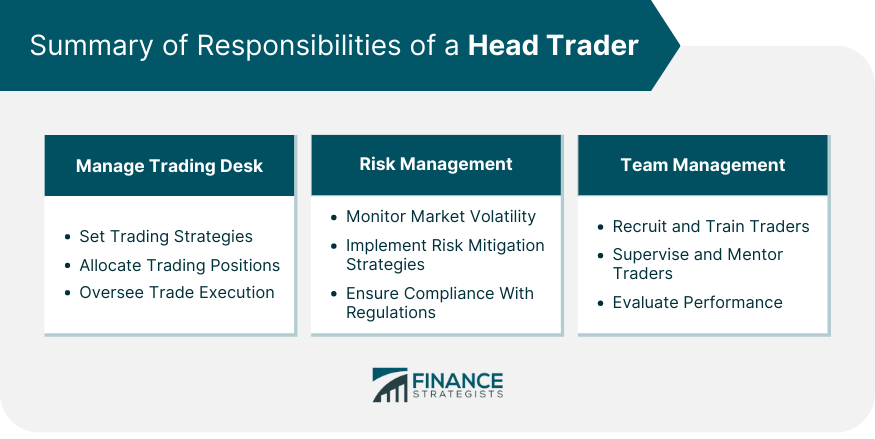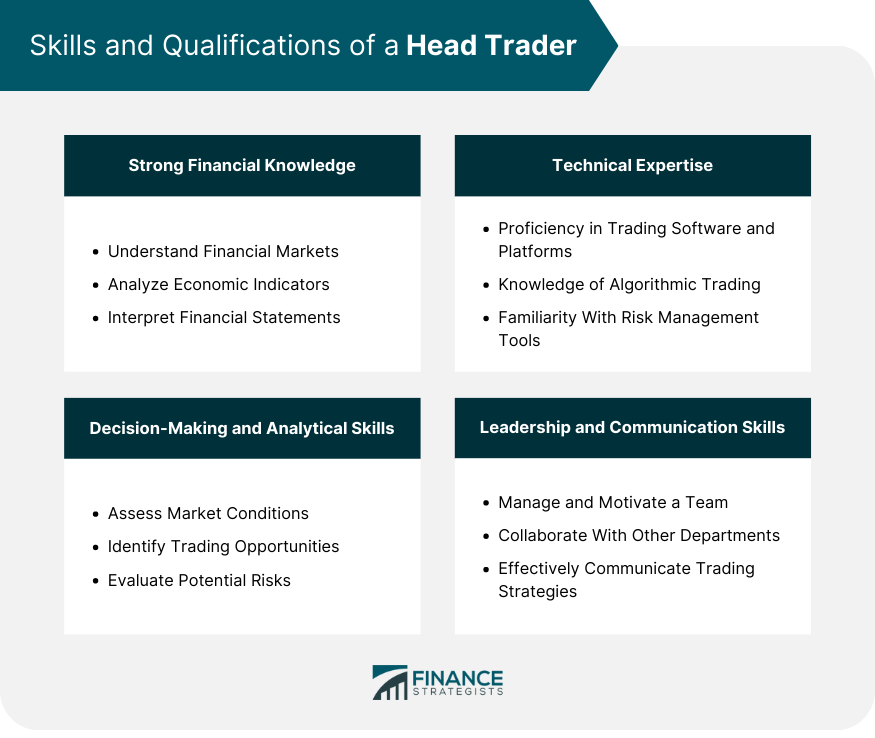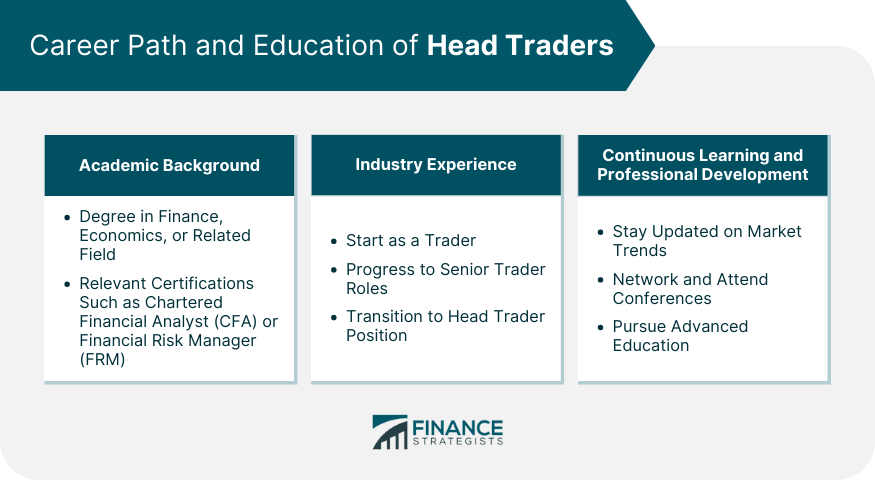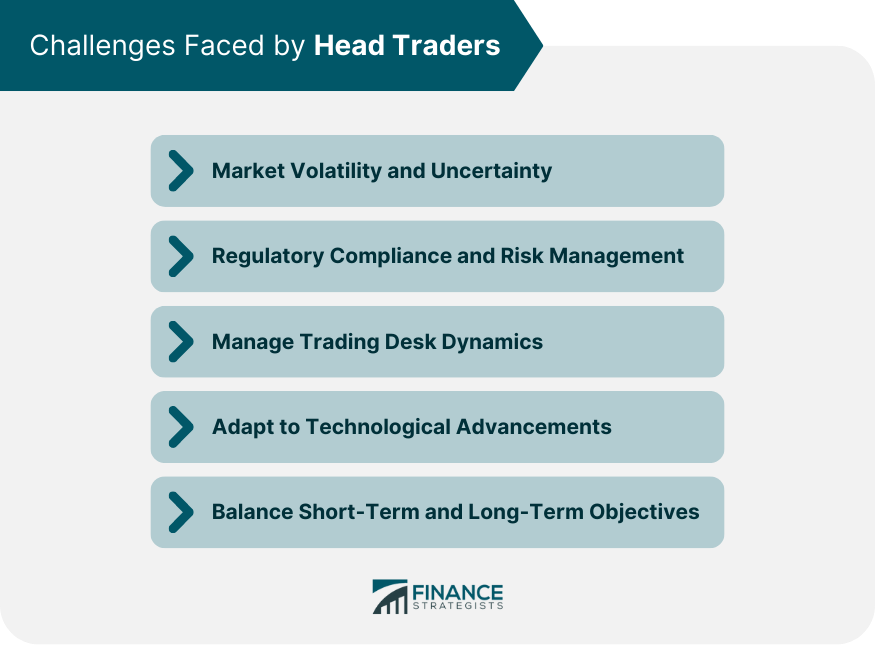A Head Trader, often considered the pinnacle of trading careers, is a financial professional who oversees a firm's trading desk. This role is responsible for making crucial trading decisions, managing risk, ensuring compliance, and leading a team of traders in executing trade orders. Head Traders play a critical role in financial markets. They manage large trading portfolios, execute high-value trades, and contribute to the liquidity of financial markets. Moreover, their strategic decisions can influence market trends, making them essential players in the global financial ecosystem. They also play a crucial role in mentoring and guiding junior traders, analyzing performance, and optimizing trading operations. The head trader's expertise and leadership are essential for achieving profitability and maintaining the overall success of the trading team. The Head Trader sets the overarching trading strategies for the firm. This involves studying market conditions, identifying potential trading opportunities, and deciding on the most effective approach to achieving trading objectives. The Head Trader also allocates trading positions among the traders on the desk. This involves assessing each trader's strengths, understanding the market's demands, and assigning positions accordingly. The Head Trader oversees the execution of trade orders, ensuring that trades are carried out efficiently and effectively to meet the firm's objectives. This involves monitoring trade performance, addressing issues promptly, and making adjustments as necessary. Head Traders monitor market volatility, which can significantly affect trading outcomes. They constantly analyze market trends and economic indicators to assess potential risks and opportunities. Head Traders also implement risk mitigation strategies to protect the firm's interests. This includes setting stop-loss orders, diversifying the trading portfolio, and employing hedging strategies. Compliance with financial regulations is a crucial responsibility of Head Traders. They ensure that all trading activities adhere to relevant laws and regulations to avoid penalties and maintain the firm's reputation. A Head Trader is responsible for recruiting and training new traders. They identify candidates with potential, provide them with comprehensive training, and equip them with the skills needed to excel in the trading environment. Head Traders supervise and mentor their team members, providing guidance and feedback to foster their professional development. They also cultivate a collaborative trading desk environment, encouraging team communication and cooperation. Head Traders evaluate the performance of their traders regularly. They provide constructive feedback and recognize outstanding performance, which motivates traders to achieve their personal and the firm's goals. Head Traders must understand financial markets in-depth, including the factors influencing market movements and trends. They should be adept at analyzing economic indicators like GDP, inflation rates, and employment figures, as these can significantly impact market conditions and trading opportunities. Head Traders should be proficient in interpreting financial statements, which can provide valuable insights into a company or asset's financial health and potential. Given the digital nature of today's trading environment, Head Traders must be proficient in using trading software and platforms. These tools aid in trade execution, risk management, and market analysis. Head Traders should also be familiar with algorithmic trading, a method that uses mathematical models and algorithms to execute trades. This can increase trading efficiency and minimize human errors. Moreover, Head Traders must be familiar with various risk management tools, such as Value at Risk (VaR) and stress testing, which can help them assess potential risks and devise appropriate mitigation strategies. Head Traders must possess excellent decision-making and analytical skills. They must assess market conditions accurately and quickly to make informed trading decisions. Moreover, they should be adept at identifying lucrative trading opportunities by analyzing market trends, economic indicators, and other relevant data. Head Traders must also be skilled at evaluating potential risks associated with trading decisions. This involves analyzing market volatility, potential market shifts, and the risk characteristics of different assets. As leaders, Head Traders should possess excellent leadership and communication skills. They must manage their team effectively, motivate them, and foster a conducive trading environment. Head Traders also need to collaborate with other departments within the firm, such as risk management, compliance, and operations. This requires strong interpersonal skills and the ability to communicate complex trading strategies clearly. Head Traders should be adept at communicating trading strategies to their team and other stakeholders. This involves explaining the strategies' rationale, expected outcomes, and potential risks. Typically, a Head Trader holds a degree in finance, economics, or a related field. This academic background provides the fundamental knowledge required in the trading environment. Relevant certifications like the Chartered Financial Analyst (CFA) or Financial Risk Manager (FRM) can enhance a Head Trader's credibility and expertise. Most Head Traders start their careers as traders, gaining hands-on experience in executing trades, analyzing markets, and managing risk. Over time, they progress to senior trader roles, gaining leadership experience and deeper market knowledge. Eventually, with their extensive experience and proven track record, they may transition to the Head Trader position, where they take on strategic and leadership responsibilities. Given the dynamic nature of financial markets, Head Traders must stay updated on market trends and developments. This involves continuous learning and staying abreast of news and research. Networking and attending industry conferences can also aid in their professional development. This provides opportunities to learn from other experts, discover new strategies, and stay informed about industry advancements. Some Head Traders may also pursue advanced education, such as an MBA, to enhance their business acumen and leadership skills. Head Traders often face the challenge of market volatility and uncertainty. This requires constant vigilance, adaptability, and robust risk management strategies. Ensuring regulatory compliance and effective risk management can also be challenging. This involves staying updated on regulatory changes and implementing comprehensive risk management measures. Managing the dynamics of a trading desk, including team management, conflict resolution, and performance evaluation, can also pose challenges. With the increasing use of technology in trading, Head Traders need to adapt to technological advancements. This includes learning new trading platforms, integrating algorithmic trading, and utilizing data analytics. Lastly, balancing short-term trading objectives with long-term strategic goals can be a challenging yet crucial task for Head Traders. They must ensure immediate trading decisions align with the firm's long-term strategic goals. The salary of a Head Trader can vary significantly based on factors such as the firm's size, geographical location, and the individual's experience and qualifications. However, it is typically a highly remunerative position, reflecting the role's complexity and responsibility. In addition to their base salary, Head Traders often receive bonuses and performance-based incentives. These can be substantial, particularly if the firm has performed well under their leadership. As financial markets continue to evolve and become more complex, the demand for experienced Head Traders is expected to remain strong. Their strategic insights, leadership skills, and risk management expertise are invaluable in navigating the dynamic and volatile trading environment. A head trader is a high-ranking professional within a financial institution who guides trading strategy, manages risks, and leads a team of traders. Their expertise and decision-making prowess significantly shape the financial trajectory of their organization and impact the broader financial market. A head trader's multifaceted role encompasses strategy formulation, trade execution, risk management, regulatory compliance, and team leadership. They are instrumental in making crucial investment decisions, monitoring market volatility, and ensuring that all trading activities align with the institution's objectives and regulatory standards. The position of head trader requires robust financial acumen, technical expertise, and exceptional leadership skills. They need to stay abreast of market trends, understand financial markets and economic indicators comprehensively, and be proficient in using cutting-edge trading software and risk management tools. Moreover, the career path to becoming a head trader involves a strong academic background in finance or economics, relevant certifications, and extensive industry experience. Continuous learning and professional development remain integral to their role in an ever-evolving financial landscape.What Is a Head Trader?
Responsibilities of a Head Trader
Managing Trading Desk
Setting Trading Strategies
Allocating Trading Positions
Overseeing Trade Execution
Risk Management
Monitoring Market Volatility
Implementing Risk Mitigation Strategies
Ensuring Compliance With Regulations
Team Management
Recruiting and Training Traders
Supervising and Mentoring Traders
Evaluating Performance

Skills and Qualifications of a Head Trader
Strong Financial Knowledge
Technical Expertise
Decision-Making and Analytical Skills
Leadership and Communication Skills

Career Path and Education of Head Traders
Academic Background
Industry Experience
Continuous Learning and Professional Development

Challenges Faced by Head Traders
Market Volatility and Uncertainty
Regulatory Compliance and Risk Management
Managing Trading Desk Dynamics
Adapting to Technological Advancements
Balancing Short-Term and Long-Term Objectives

Compensation and Job Outlook
Salary Range for Head Traders
Bonus and Performance-Based Incentives
Job Growth and Industry Demand
Conclusion
Head Trader FAQs
A head trader is a senior position in a financial institution responsible for overseeing and managing trading activities, making strategic decisions, and ensuring the profitability of the trading desk.
To become a head trader, typically, one needs a strong background in finance or economics, extensive experience in trading, exceptional analytical and decision-making skills, and a proven track record of successful trading performance.
The main responsibilities of a head trader include formulating trading strategies, managing a team of traders, monitoring market conditions, analyzing market data and trends, executing trades, managing risk, and achieving profitability targets.
Unlike other traders who focus on executing trades, a head trader is responsible for overseeing the entire trading desk, making strategic decisions, managing risk, and ensuring the overall success of the trading operations.
The career progression for a head trader typically involves starting as a junior trader, advancing to a senior trader or portfolio manager role, and then transitioning to a head trader position. Further career advancement may include roles such as a director of trading or a chief investment officer.
True Tamplin is a published author, public speaker, CEO of UpDigital, and founder of Finance Strategists.
True is a Certified Educator in Personal Finance (CEPF®), author of The Handy Financial Ratios Guide, a member of the Society for Advancing Business Editing and Writing, contributes to his financial education site, Finance Strategists, and has spoken to various financial communities such as the CFA Institute, as well as university students like his Alma mater, Biola University, where he received a bachelor of science in business and data analytics.
To learn more about True, visit his personal website or view his author profiles on Amazon, Nasdaq and Forbes.













